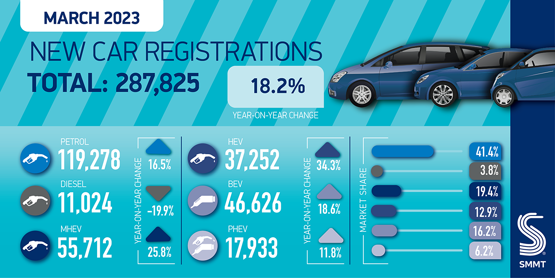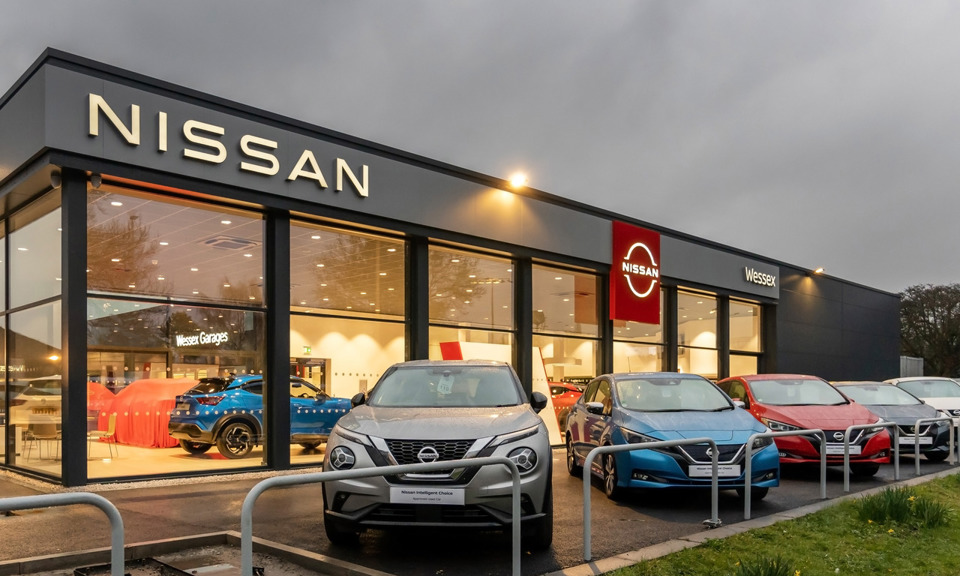New car registrations ended Q1 2023 on a high after demand from large fleets drove year-on-year volume growth of 18.2%.
A statement issued by the Society of Motor Manufacturers and Traders (SMMT) this morning (April 5) celebrated the best ‘new plate month’ performance since before the COVID-19 pandemic but it was businesses – rather than a rush of retail customers into UK dealerships – that powered the market.
A total of 287,825 units were delivered, with private buyers up by 1.4% on 2022 as those to large fleet swelled by 40.9% to 40,651 units.
Registrations by businesses with fleets of fewer than 25 vehicles rose 26%.
The result was the eighth consecutive month of growth for the new car market and the strongest Q1 registrations performance since 2019, with 494,260 new cars (up 18.4%) representing an additional £2.7 billion in deliveries.
 SMMT chief executive Mike Hawes said: “March’s new plate month usually sets the tone for the year so this performance will give the industry and consumers greater confidence.
SMMT chief executive Mike Hawes said: “March’s new plate month usually sets the tone for the year so this performance will give the industry and consumers greater confidence.
“With eight consecutive months of growth, the automotive industry is recovering, bucking wider trends and supporting economic growth.
“The best month ever for zero emission vehicles is reflective of increased consumer choice and improved availability but if EV market ambitions – and regulation – are to be met, infrastructure investment must catch up.”
 Petrol-powered vehicles remained the most popular fuel type during March, comprising 56.3% of new units, while zero-emissions electric vehicle (EV) deliveries reached a record monthly high of 46,626 – representing growth of 18.6%.
Petrol-powered vehicles remained the most popular fuel type during March, comprising 56.3% of new units, while zero-emissions electric vehicle (EV) deliveries reached a record monthly high of 46,626 – representing growth of 18.6%.
EV market share remained almost the same as last year at 16.2% as plug-in hybrid (PHEV) registrations grew 11.8% to leave plug-in vehicles’ overall market share at 22.4% – a slight decline on 2022.
The biggest growth was in hybrids (HEVs), with a 34.3% surge helping electrified vehicles account for more than one in three registrations for the month, the SMMT said.
Diesel registrations fell 19.9%, from 13,756 units to 11,024.
 National Franchised Dealers Association (NFDA) chief executive Sue Robinson said Q1 2023 had been positive for UK new vehicle sales, adding: “It is extremely encouraging to see sales figures starting to emulate pre-pandemic trends, particularly for the plate change month of march and consecutive months of optimism and growth
National Franchised Dealers Association (NFDA) chief executive Sue Robinson said Q1 2023 had been positive for UK new vehicle sales, adding: “It is extremely encouraging to see sales figures starting to emulate pre-pandemic trends, particularly for the plate change month of march and consecutive months of optimism and growth
“As supply constraints start to ease and waiting times for products begin to fall, dealers are finding it easier to sell their stock to customers.
“Whilst there are a prominent range of pressures facing the sector, including unprecedented levels of inflation, cost of living crisis and the fall out of the Russia-Ukraine crisis still affecting global supply chains, cars are still regarded as a necessity to many, whether it be for commuting or day-to-day life, and this will always be the strongest asset for franchised dealers.
“NFDA expects current trends to continue into Q2, with electric vehicles maintaining popularity among consumers with growing market share.”
Robinson added: “Ten years to date, alternatively fuelled vehicles (AFV) held a minute 1.3% of the market share, selling 5318 units in March 2013.
“In March 2018, five years ago, AFV market share had grown to 5.1% with 24,126 units sold. Today, it is extremely positive to see electric vehicles now a dominant driving force within the UK market, recording a market share of (35.4%), with 101,811 units sold and franchised dealers are undoubtedly a pivotal factor in driving this trend.
“Franchised Dealers with their Electric Vehicle Approved (EVA) accreditation are at the forefront of EV retail and continue to help consumers enter and navigate the EV market.”















Login to comment
Comments
No comments have been made yet.